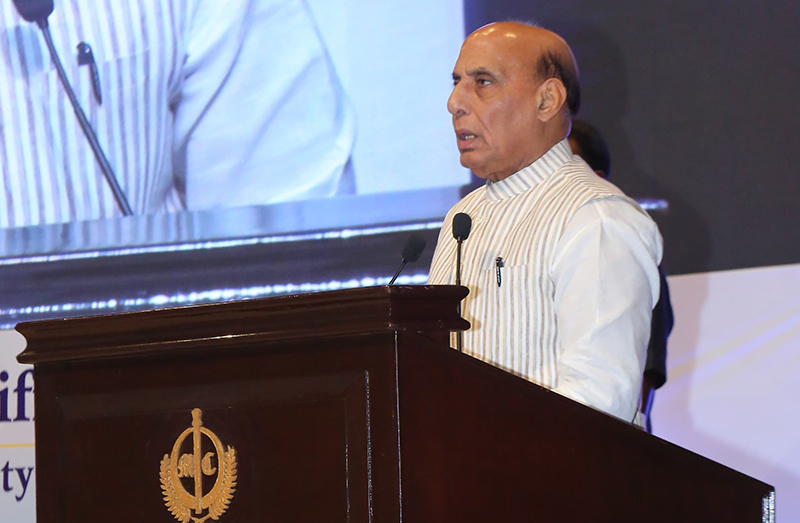 Rajnath Singh
Rajnath Singh
India’s vision for Indo-Pacific is based on fostering partnerships through sustainable development, economic growth, mutual security: Rajnath Singh
Indian Defence Minister Rajnath Singh on Friday said India’s vision for the Indo-Pacific is based on Prime Minister Narendra Modi’s idea of SAGAR (Security and Growth for All in the Region) as the country believes in fostering partnerships that prioritise sustainable development, economic growth and mutual security.
Addressing the Indo-Pacific Regional Dialogue (IPRD) 2024 in New Delhi on Oct 4, Singh emphasised that India’s engagement with its partners is guided by the understanding that true progress can only be achieved through collective action and synergy, and due to these efforts, it is now considered as a credible & preferred security partner and first responder in the region.
Rajnath Singh reiterated India’s unwavering resolve to a rule-based international order, respect for international law, and adherence to the principles enshrined in the UN Convention on the Law of the Sea, describing them as the cornerstones of foreign policy.
“India has consistently advocated for a peaceful resolution to disputes and has sought to promote cooperation among nations in the Indo-Pacific, with a strong emphasis on the centrality of ASEAN in fostering regional dialogue, stability & collective growth,” he said.
Singh also underscored India’s commitment to ensuring the safety and security of the vital international maritime routes.
He added that the engagement with regional partners, including joint exercises and information-sharing initiatives, is aimed at strengthening the collective maritime security framework.
Rajnath Singh underlined that the Indian Armed Forces, especially Navy, has been at the forefront of cooperative endeavours with countries of the region, and are continuously working towards building their capacity and capabilities.
“While India’s endeavour for maritime cooperation continues, its interests are not in conflict with any other country. At the same time, interests of any other nation should not come in conflict with other nations. This is the spirit in which we must work together,” he added.
Singh pointed out that the rapidly evolving global maritime landscape is shaped by shifting power dynamics, resource competition & emerging security threats.
He added that the emergence of the Indo-Pacific theatre reflects a visible balancing of global power.
“The Indo-Pacific region has emerged as the world’s most dynamic geopolitical zone and is the centre of gravity of the economic & strategic interests. It also carries a degree of pre-existing international tension, rivalry and conflict. While some challenges are of local nature, many challenges have global ramifications. With respect to marine resources, we are witnessing a significant increase in geopolitical competition. As populations continue to grow, the demand for marine resources has surged, leading to heightened tensions and competition among nations,” he added.
Sharing insights on the subject of ‘Global Commons’, the natural resources such as the ocean, outer space, climate, clean air, etc., which is shared by all of humanity, Rajnath Singh stated that these are essential to maintain a sustainable planet.
He stressed on the need to create a balance of competing interests, which can offer numerous ecological, economic, and social benefits transcending national boundaries.
Singh also touched on the concept of ‘tragedy of the commons’, a scenario where individuals, acting in their own self-interest, deplete shared resources, leading to collective ruin.
He termed it as a looming threat, which can only be dealt with if the international community comes together and acts swiftly for sustainable management of shared global commons.
“Evidence of this tragedy, including environmental degradation, over-extraction of certain resources, and increasing geopolitical tensions is already visible. We are witnessing localised incidents of conflict and a wider undercurrent of international tension in recent years. As the world transforms from an industrial world to a technological world, from a fossil fuel-based economy to renewables, this threat is only going to increase, unless we take pre-emptive steps to control possible damage,” said Rajnath Singh.
Singh expressed concern over certain attempts to monopolise and weaponise critical resources for strategic reasons, terming these tendencies as not conducive for the global good.
He underscored peaceful coexistence and comity among nations, and drew upon the ancient Indian philosophy of humankind's symbiotic existence in harmony with nature as a way ahead in the exploration and management of marine resources.
In his address, Chief of the Naval Staff Admiral Dinesh K Tripathi emphasised the relevance of the oceanic spaces, specifically the Indo-Pacific, for India’s economic growth and security.
Stressing that India’s maritime policy of SAGAR envisioned collective prosperity and security for all in the region, he advocated collaboration and cooperation as the principal means to achieve this end-state.
On the occasion, Singh also released a book titled ‘Maritime India: Temporal and Spatial Continuum’, published by the National Maritime Foundation (NMF). Chief of Defence Staff General Anil Chauhan; Chief of the Army Staff General Upendra Dwivedi; Chief of the Air Staff Air Chief Marshal AP Singh; Chairman, NMF Admiral Karambir Singh (Retd); DG, NMF Vice Admiral Pradeep Chauhan (Retd); senior officials of Ministry of Defence, foreign delegates and representatives of think-tanks of India & abroad attended the event.
Support Our Journalism
We cannot do without you.. your contribution supports unbiased journalism
IBNS is not driven by any ism- not wokeism, not racism, not skewed secularism, not hyper right-wing or left liberal ideals, nor by any hardline religious beliefs or hyper nationalism. We want to serve you good old objective news, as they are. We do not judge or preach. We let people decide for themselves. We only try to present factual and well-sourced news.







